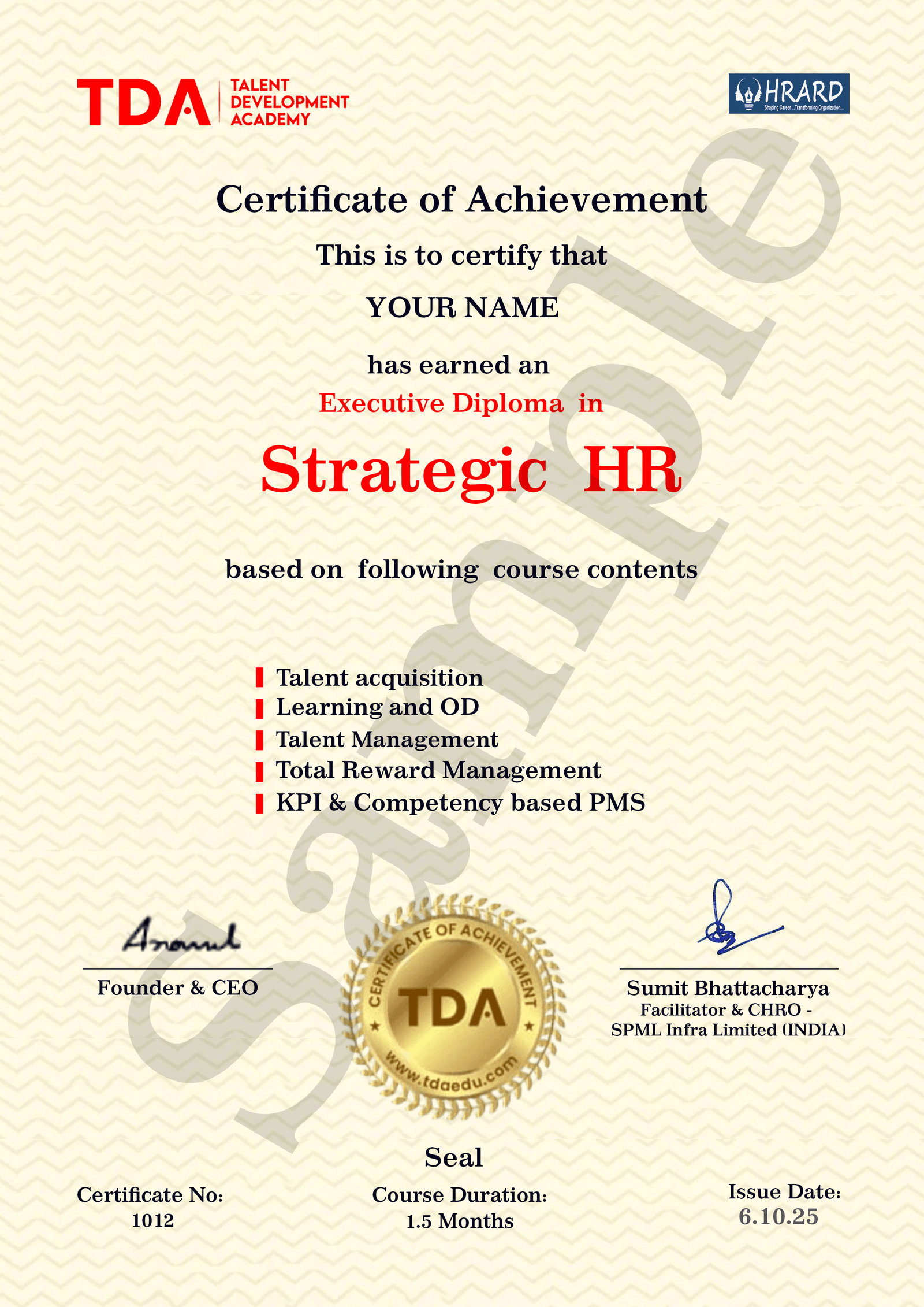Psychology Masterclass For HR
Professionals
Industry Expert Faculties
Our trainers are highly experienced HR professionals who bring real-world expertise to the classroom.

Dr. SUMIT BHATTACHARYA
25+ Years of HR Experience
Chief Human Resources Officer
SPML Infra Limited - INDIA (The Largest Infrastructure company in South Asia)
"Asia's 100 Most Impactful HR Leaders Award 2025"
Universities connected with University of Minnesota, Yale University, University of Michigan, University of California,University of Toronto, University of Pennsylvania SHRM- USA

- Course Duration: 1.5 Months
- Class Duration: 2 Hours
- Total Session: 12
- Ongoing Batch: Batch 06
- Class Starts: 29 May, 25
- Classes on: Sunday & Thrusday
- Classes Time: 09:00 PM - 11:00 PM
Course Content
Module 1: Foundation of psychology and research findings in psychology
- 1. The discovery that our mental lives have a physical basis
- 2. Introducing the field of neuroscience.
- 3. Two major psychological theories that have come to shape the world that we now live in—Freud’s psychodynamic theory and Skinner’s theory of behaviorism
Module 2: Language in psychology
- 2.1 Foundational psychological research into development and language
- 2.2 Methods for studying how infants and children think and the core discoveries that they have led to.
- 2.3 The structure of language, how language is learned, and end with a little bit on animal communication, language processing, and relationship between language and thought.
Module 3: Work and personnel psychology and Well-being in psychology
- 3.1 Definition and scope of work psychology.
- 3.2 Role of work psychology in understanding human behavior in the workplace.
- 3.3 Key concepts and theories in work psychology
- 3.4 Current trends in work organization personnel psychology
- 3.5 Human behavior in the organization
- 3.6 Behavior assessment for employee selection
- 3.7 Analyzing Jobs and Work
- 3.8 Job Satisfaction
- 3.9 Job stress and its solution
- 3.10 Motivational psychology
- 3.11 Organizational psychology
- 3.12 Human Resource Planning And Development
- 3.13 Industrial and Organizational Psychology
- 3.14 Organizational Development & Quality of Work Life
- 3.15 Stress Management in Workplace and Counselling Techniques
- 3.16 Causes and effects of workplace stress
- 3.17 How psychologists measure happiness and what factors contribute to the good life
- 3.18 Health Psychology
Module 4: Cognition in psychology
- 4.1 Practical exposure on Cognitive psychology.
- 4.2 How we perceive the world, how attention works, and we store our experiences in memory.
- 4.3 Cognitive Functioning
- 4.4 Applied Cognitive Psychology
- 4.5 Behavioral and cognitive neuroscience (learning and cognition)
Module 5: Self and others in psychology
- 5.1 Applied Psychology examining the self and others.
- 5.2 Social and non-social emotions.
- 5.3 How we deal with other people—social psychology.
Module 6: Variation in psychology
- 6.1 Applied Psychology on human variation
- 6.2 The focus on personality and intelligence
- 6.3 Role of genes and environment in explaining individual differences.
- 6.4 Focus on clinical psychology by reviewing prominent mental illnesses and therapies.
- 6.5 Environmental Psychology
- 6.6 Mental Status Examination, Testing
- 6.7 Positive Psychology
- 6.8 Psychological Experiments and Testing
- 6.9 Psychological Remedies
- 6.10 Psychology of Interpersonal relationship
- 6.11 Statistics in Psychology
Module 7: Human psychology & personality profiling
- 7.1 Historical Background of Contemporary Psychodiagnostics
- 7.2 Current International Standards Psychologist – Psychodiagnostic Activity
- 7.3 Homotheticity and Ideographic Approach of Contemporary Psychodiagnostics
- 7.4 Personality Theories, Testing and Their Application
Module 8: Applied behavior analysis, assessment and measurement
- 8.1 Science of human behavior
- 8.2 Behavior analysis
- 8.3 Behavioral measurement and assessment (Methods and techniques used in behavior analysis assessment and measurement.)
- 8.4 Experimental analysis of behavior
- 8.5 Explanation of applied behavior analysis and its relevance to understanding human behavior.
- 8.6 Psychological assessment and differences between each individual
- 8.7 Ethics for applied behavior analysts
- 8.8 Observation, critical thinking and decision making
- 8.9 Methods in applied behavior analysis: design of interventions
- 8.10 Leadership psychology
Module 9: Behavioral consultation and supervision
- 9.1 Role of behavioral consultation and supervision in understanding and modifying human behavior.
- 9.2 Techniques and strategies used in behavioral consultation and supervision.
Module 10: Applied Social psychology
- 10.1 Definition and application of social psychology in real-world settings
- 10.2 Examples of applied social psychology research and interventions
- 10.3 Applied Social Psychology and Social Problems
- 10.4 Personality theories (Big Five, MBTI, etc.)
- 10.5 Assessment tools and techniques
- 10.6 Influence of personality on job performance and team dynamics
- 10.7 Managing diverse personalities in the workplace
Module 11: Psychoanalysis Freud’s Psychoanalytic Theory
- 1 Dream analysis and the unconscious mind Jungian Psychoanalysis
- 2. Discussion: Archetypes, collective unconscious, individuation Lacanian Psychoanalysis
- 3. Discussion: The mirror stage, the real, the symbolic, and the imaginary Psychoanalytic Techniques
- 4. Techniques: Free association, transference, countertransference Object Relations Theory
- 5. Concepts: Object relations, transitional objects Psychoanalysis and Developmental Psychology
- 6. Erikson’s psychosocial development stages Psychoanalysis and Culture
- 7. Psychoanalysis in literature and film
Module 12: Emotional Intelligence (EI) in the Workplace
- 1. Definition and components of EI
- 2. Measuring EI
- 3. The impact of EI on leadership and team performance
- 4. Developing and enhancing EI in employees
Registration Now

Milestones and
Achievements
Highlighting our impactful accomplishments and successful milestones with meaningful metrics.
Total Learners
0
+
Certified Professionals
0
+


